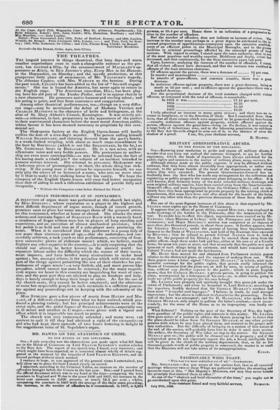MR. HAWES ON THE STATISTICS OF CRIME.
TO THE EDITOR OF THE SPECTATOR.
SIR—I only yesterday saw the observations you made upon what fell from sue in the House of Commons on Lord FRANCIS EGERTON'S motion relative to the Beer Act. The report of my speech was, I found, very incorrect ; and which might have been expected, as it consisted almost wholly of details sug- gested at the moment by the remarks of Lord FaaNcis EGERTON, and de- livered perhaps without much method. venture to hope, as you approved of the general views I entertained, you will allow me to place the facts 1 stated clearly on record. I admitted, according to the Criminal 'Fables, an increase on the number of offenders brought before the Courts in the last year. But—and I quoted from the official document which was in my hand at the time—comparing the total numbers in England and Wales in the years 1836 and 1837, the increase in the latter year amounts to 2,6% persons, or nearly 12.5 per cent. ; whilst, comparing the numbers in 1837 with the average of the three years preceding, the inerearre, in the norther of offenders be it remembered, in 1837, is 2,224 persons, or 10.4 per cent. Hence there is an indication of a progressive de. cline in the number of offenders.
But the number of offenders does not indicate an increase of crime. The increase in the number may perhaps in a great degree be attributed to the ie. creased proportion of apprehensions consequent upon the extensive establish. ment of an efficient police in the Municipal Boroughs, and to the grimes facilities in criminal proceedings afforded by the extended grants of local sessions. With regard to crime, I stated upon the same authority, that in twe of the most populous and wealthy counties, Middlesex and Surry, crime had decreased, and that continuously, for the three successive years last past. Upon, however, analyzing the increase of the number of offenders, I stated, that all violent offences have decreased, and that the increase was confined 41 offences of the least atrocious character.
Of offences against the person, there was a decrease of 12 per cent. In murder and manslaughter 7 In assaults of peace-officers, and common assaults, there was a greet decrease.
In malicious offences against property, there was a great decrease, being as much as 32 per cent. ; and in offences against the game-laws there was marked decrease.
But the proportional decrease of the total numbers charged with violent offences, as compared with the total of offences, is remarkable.
In 1834 it was 17.44 per cent.
1835 16.25 1836 15.50 1837 13.21 I fully admitted an increase in many petty crimes; and there was an ire crease in burglaties, or in the detection of them. But I contended from then facts, that all those crimes which were supposed to be generated by beer-houses —assaults, malicious offences against property, violent offences against the person, offences against the game-laws—being on the decline, it was unjust ts a large body of industrious men, and to the labouring population, to attribute to the Beer Act the evils alleged to arise out of it, in the absence of even the shadow of a proof. I am, Sir, your obedient servant, B. HAWES.


























 Previous page
Previous page